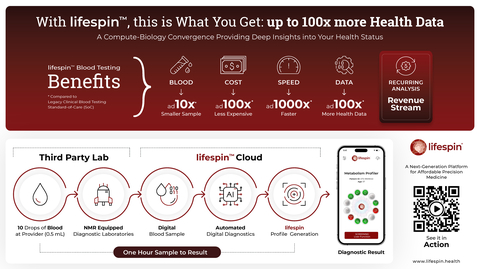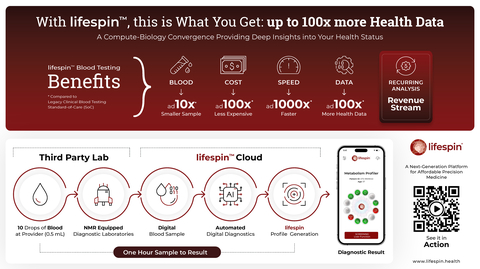REGENSBURG, Germany--(BUSINESS WIRE)--Lifespin GmbH, based in Regensburg (Germany), with offices in Boston, Massachusetts, announced today that it has entered into a significant scientific collaborative agreement with Leipzig Research Center for Civilization Diseases (LIFE) and Leipzig Medical Biobank to study whether certain patients who are obese or have diabetes have identifiable variations in their metabolism that may indicate predisposed risk for these conditions.
Lifespin, an emerging medical technology company, has built one of the largest and most comprehensive databases of metabolic health profiles across healthy and diseased individuals covering multiple age and biological sex groups as well as specific diseases in neurology, oncology, and inflammation. Utilizing proprietary software and A.I., Lifespin is working to launch new products and services (SaaS) that enable clinicians, researchers, drug development organizations, and other entities to identify various disease states and health and wellness markers based on a patient’s metabolism.
The Leipzig Research Center for Civilization Diseases and Leipzig Medical Biobank have agreed to provide Lifespin with access to 8,000 patient samples from the LIFE Adult study, a long-term, population-based cohort study. The LIFE study includes people from the Leipzig adult population ranging in age from 40 to 80 years, who are being comprehensively studied for disease risks, frequency of more common diseases, such as obesity and diabetes, and the influence of certain lifestyle and environmental factors on their health. A primary goal of the study is to identify previously unknown risk factors for developing non-communicable diseases (NCDs), from which new early detection methods could then be developed.
“This partnership will help to shed new light on one of the largest issues in today’s societies, namely the increase of non-communicable diseases such as obesity and diabetes which can lead to downstream diseases such as inflammation, cancer, or cardiovascular diseases, and the potential ability to identify risk factors that may appear as variations in a person’s metabolism,” said Lifespin’s CEO, Dr. Ali Tinazli. “Given the broader aging of our population, and the growing onset of these types of NCDs as we get older, identifying new ways such as our metabolism to predict and manage diseases of this nature are urgently needed.”
“Our scientific cooperation with Lifespin supports our central goal to provide deep insights into the relationships between genetic predisposition, personal lifestyle, and environmental factors with individual health status and the development of lifestyle diseases such as type 2 diabetes mellitus at the population level,” said Dr. Ronny Baber, Head of Leipzig Medical Biobank.
The metabolic profiles created by Lifespin will be returned to the Leipzig Research Center for Civilization Diseases, to be used to further expand the research database already established by LIFE. Data will also be available to researchers at Leipzig University Medical Center, and to external cooperation partners for follow-up analyses and further scientific projects.
“This important collaboration brings together the complementary, strong assets of both partners,” said Dr. Roland Geyer, COO of Lifespin GmbH. “Utilizing access to the phenotypic data collected in the LIFE study, our Lifespin technology will be able to generate metabolite profiles of this cohort that can then be compared to Lifespin’s comprehensive healthy baseline, potentially enabling the identification of biomarkers or metabolite signatures that may be helpful in predicting risk factors for some NCDs such as type 2 diabetes.”
Lifespin (www.lifespin.health) is a deep data company that seeks to detect distinct deviations in the human metabolism caused by diseases. Lifespin’s proprietary technology, which merges biology, deep data, artificial intelligence, and cloud platforms to deliver unique digital metabolic insights, enables a new field of precision diagnostics based on studies that show that pathogenesis impacts metabolism, causing specific changes in the presence and quantity of metabolites. Lifespin has built one of the world’s largest in-house biobanks that already consists of more than 200,000 human blood samples. Utilizing proprietary diagnostic technology, Lifespin can quantitatively capture individual metabolisms, i.e., up to hundreds of metabolite concentrations with a single Nuclear Magnetic Resonance (NMR) measurement, and perform in-house measurements of metabolomes, digitizing metabolic profiles that include billions of metabolic relationships. These digital metabolic profiles allow systematic mapping across various health conditions. Taken together, Lifespin’s technology and world-class database have the potential to enable differential diagnosis and early detection of health conditions, staging of diseases, monitoring of treatment success and personalized medicine, improving the gold standard in numerous indications and bringing about new diagnostic products, where none exist today (e.g., in some neurological diseases); precision drug monitoring for clinical, pharmaceutical and research settings; and precision nutrition for diabetes, obesity, dietary and lifestyle intervention. Lifespin’s cloud-based business model is built on its proprietary Software-as-a-Service (SaaS) platform for diagnostics and health information and is globally scalable. Tests for detection of neurological, cancer, and inflammatory diseases are in development with first regulated products expected in 2023. Lifespin’s products offered to date are for Research Use Only (RUO) and are not for use in diagnostics. Lifespin is ISO13485:2016 certified. Lifespin’s advisory board consists of key opinion leaders such as James Rothman (Nobel Laureate in Physiology/Medicine, Sterling Professor of Cell Biology, Yale University, New Haven, CT USA) and other prominent leaders in the relevant fields of study.
LIFE – Leipziger Forschungszentrum für Zivilisationskrankheiten (https://www.uniklinikum-leipzig.de/einrichtungen/life) was founded in 2009 as part of the Saxon State Excellence Initiative with funding from the European Union (ERDF), the European Social Fund (ESF) and the Free State of Saxony. Since then, LIFE has become an integral part of the research landscape at Leipzig University Medical Center and the University of Leipzig. Over 30,000 Leipzig residents have been included in the cohorts to date. In its research activities, LIFE focuses on the common diseases of our population that are associated with modern lifestyles, such as diabetes, heart attack, stroke, atherosclerosis, stress, dementia, or depression. Due to demographic change, a steady increase in the number of patients affected by these diseases and thus in the burden of disease for society can be expected in the coming years. Through the establishment and funding of the LIFE Research Center and numerous follow-up projects, state-of-the-art infrastructure for molecular and systems medicine analytics has been established at the Leipzig research site. This includes the Leipzig Medical Biobank, a technologically advanced cryobiobank in which approximately 1.5 million biospecimens are stored for future analysis. Via the LIFE research database and the LIFE data portal, the data and samples from the LIFE studies can be made available in high quality to all scientists at Leipzig University Medical Center as well as to national and international cooperation partners. The results of LIFE thus benefit the scientific progress of medicine and the health care of our population.




